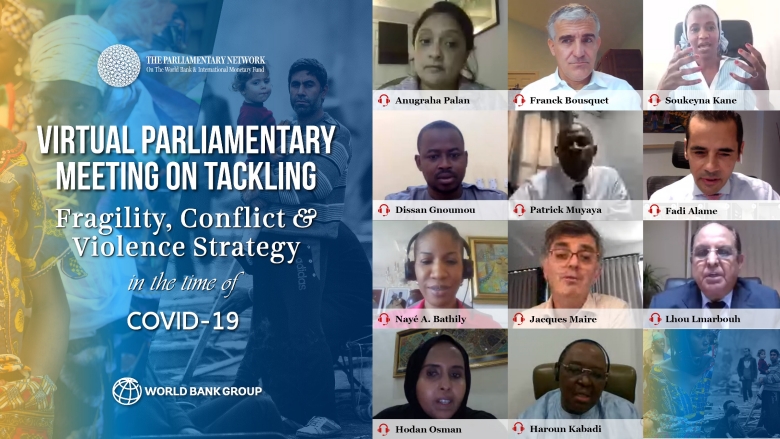Through presentations from Franck Bousquet, Senior Director, Fragility, Conflict and Violence, World Bank and Soukeyna Kane, Country Director for the Sahel Countries, World Bank, parliamentarians gained a deeper understanding of the World Bank Group’s comprehensive, adaptable, and evidence-based FCV strategy, with specific examples of operations in the Sahel region. They also gained insights into how the strategy provides a framework to guide both emergency and longer-term interventions in countries now also fighting COVID-19. Parliamentarians from countries impacted by or implicated in FCV also shared their perspectives on actions legislators can take in shaping policies, allocating budgets, overseeing their governments and pinpointing the needs of marginalized communities. They underscored the importance of international solidarity and partnerships, both with the World Bank Group and with fellow parliamentarians, in achieving sustainable country outcomes. They also encouraged the participation of multiple stakeholders and local actors, such as civil society, to bridge differences and ensure inclusive development.
Participants elaborated on how the health and economic crisis being spurred by COVID-19 is compounding their challenging parliamentary functions in countries impacted by FCV. As nations declare states of emergency and governments are being granted exceptional authority, parliament’s oversight function becomes all the more important, and difficult. Participants also cited allocating funds from the budget to human capital and preventative social programs versus spending on security as an ongoing issue that COVID-19 will only complicate further as economies slow and limited funds are redirected toward the pandemic response.
“This is not only about additional resources; it’s about asking countries to make sure that they have a plan to address prevention and resilience. And that our programs aim at addressing prevention and resilience.” Soukeyna Kane, Country Director for the Sahel Countries, World Bank
Addressing FCV is crucial to achieving the World Bank Group’s twin goals to end extreme poverty and boost shared prosperity. While extreme poverty is falling around the world, it is increasing in countries affected by FCV, where it is estimated that up to two-thirds of the world’s extreme poor will reside by 2030. The COVID-19 outbreak is only exacerbating development efforts in these complex settings.
“Conflict and pandemics do not recognize borders and do not need passports,” Franck Bousquet, Senior Director, Fragility, Conflict and Violence, World Bank
The World Bank Group is doing more, and doing it differently, scaling up and expanding its commitments to the most vulnerable communities in FCV situations through long-term, multi-faceted and tailored approaches to national and regional needs. The latest International Development Association (IDA) financing package, IDA19 includes $18.7 billion of support for FCV-affected countries – a 27 percent increase from the previous IDA18 replenishment, which had already doubled funding for FCV. The World Bank Group has evolved its work from a focus on post-conflict reconstruction to address challenges across the full spectrum of fragility – before, during and after crises. Countries impacted by FCV will also be prioritized in the $160 billion in COVID-19 financing over the next 15 months.
Key takeaways of the meeting included:
- The significant role of parliamentarians in achieving development outcomes as part of the WBG’s evolved approach to FCV, especially vis a vis government oversight and accountability, and through community-driven approaches that prioritize the most vulnerable given their proximity to people on the ground.
- The multiplicity of crises facing FCV countries: in addition to insecurity, they are grappling with socio-economic challenges, climate change, and most recently COVID-19.
- The importance of human capital investments in FCV settings (health, education, nutrition) and prioritizing spending on prevention and reaching marginalized people in spite of scarce fiscal resources. COVID-19 is the latest of many crises competing for funds.
- The need for increased collaboration among development, humanitarian, and security actors as well as solidarity between parliamentarians across borders.


